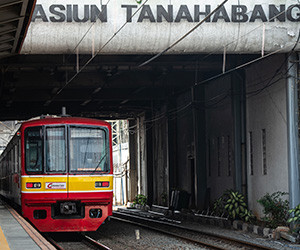Popular Reads
Top Results
Can't find what you're looking for?
View all search resultsPopular Reads
Top Results
Can't find what you're looking for?
View all search resultsGovt to cut commuter line subsidy for higher earners in 2023
Change text size
Gift Premium Articles
to Anyone
T
he government will discontinue subsidies for commuter line train (KRL) tickets for middle- to upper-income passengers, in a bid to reduce the burden on the state budget, while allowing policymakers to target the funds for lower- to middle-income users, as well as less favored regions.
The Transportation Ministry announced on Tuesday that the policy would lead to those considered “the haves” paying full non-subsidized ticket prices, changing the prevailing policy that allows all groups to take equal advantage of the lower fares.
Under the subsidy, the public can ride the commuter line for Rp 3,000 (19 US cents) for the first 25 kilometers, whereas the fare should be around Rp 14,981.
“Those in ties, those in higher-income groups must pay a different price [from those in lower-income groups],” Transportation Minister Budi Karya Sumadi told reporters during a year-end briefing held by the ministry.
Read also: LRT, HSR to be operational by mid-2023: Jokowi
During the first 10 months of this year, more than 80 percent of monthly train passengers on Java Island were on intercity line trains with the rest comprised of passengers traversing within cities and provinces, Statistic Indonesia (BPS) data show.
The data suggest that many people rely on KRL to travel around Greater Jakarta including Bogor, Bekasi and Depok in West Java and Tangerang, Banten.
















